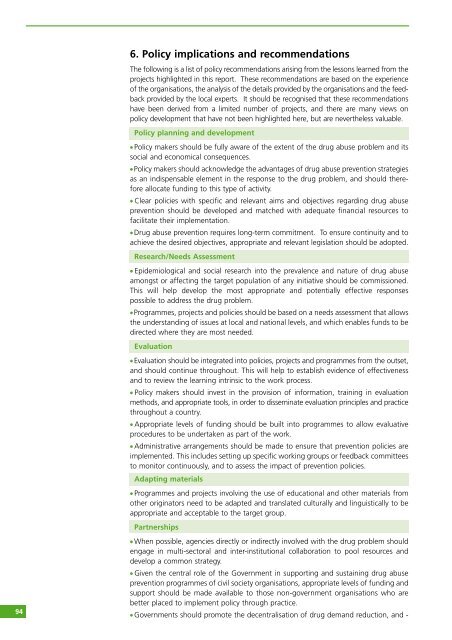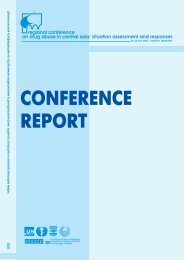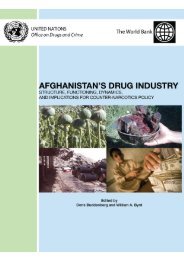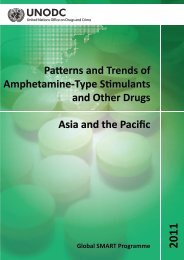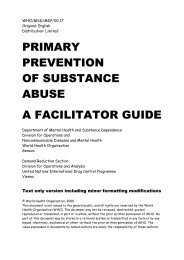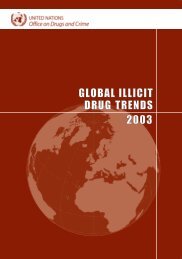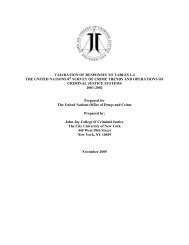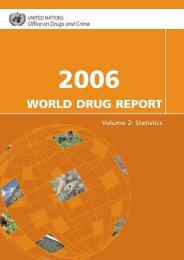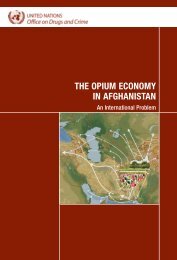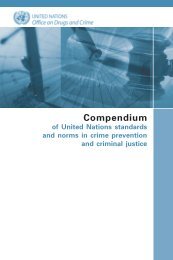PDF (Lessons learned in drug abuse prevention: a global review)
PDF (Lessons learned in drug abuse prevention: a global review)
PDF (Lessons learned in drug abuse prevention: a global review)
You also want an ePaper? Increase the reach of your titles
YUMPU automatically turns print PDFs into web optimized ePapers that Google loves.
94<br />
6. Policy implications and recommendations<br />
The follow<strong>in</strong>g is a list of policy recommendations aris<strong>in</strong>g from the lessons <strong>learned</strong> from the<br />
projects highlighted <strong>in</strong> this report. These recommendations are based on the experience<br />
of the organisations, the analysis of the details provided by the organisations and the feedback<br />
provided by the local experts. It should be recognised that these recommendations<br />
have been derived from a limited number of projects, and there are many views on<br />
policy development that have not been highlighted here, but are nevertheless valuable.<br />
Policy plann<strong>in</strong>g and development<br />
● Policy makers should be fully aware of the extent of the <strong>drug</strong> <strong>abuse</strong> problem and its<br />
social and economical consequences.<br />
● Policy makers should acknowledge the advantages of <strong>drug</strong> <strong>abuse</strong> <strong>prevention</strong> strategies<br />
as an <strong>in</strong>dispensable element <strong>in</strong> the response to the <strong>drug</strong> problem, and should therefore<br />
allocate fund<strong>in</strong>g to this type of activity.<br />
● Clear policies with specific and relevant aims and objectives regard<strong>in</strong>g <strong>drug</strong> <strong>abuse</strong><br />
<strong>prevention</strong> should be developed and matched with adequate f<strong>in</strong>ancial resources to<br />
facilitate their implementation.<br />
● Drug <strong>abuse</strong> <strong>prevention</strong> requires long-term commitment. To ensure cont<strong>in</strong>uity and to<br />
achieve the desired objectives, appropriate and relevant legislation should be adopted.<br />
Research/Needs Assessment<br />
● Epidemiological and social research <strong>in</strong>to the prevalence and nature of <strong>drug</strong> <strong>abuse</strong><br />
amongst or affect<strong>in</strong>g the target population of any <strong>in</strong>itiative should be commissioned.<br />
This will help develop the most appropriate and potentially effective responses<br />
possible to address the <strong>drug</strong> problem.<br />
● Programmes, projects and policies should be based on a needs assessment that allows<br />
the understand<strong>in</strong>g of issues at local and national levels, and which enables funds to be<br />
directed where they are most needed.<br />
Evaluation<br />
● Evaluation should be <strong>in</strong>tegrated <strong>in</strong>to policies, projects and programmes from the outset,<br />
and should cont<strong>in</strong>ue throughout. This will help to establish evidence of effectiveness<br />
and to <strong>review</strong> the learn<strong>in</strong>g <strong>in</strong>tr<strong>in</strong>sic to the work process.<br />
● Policy makers should <strong>in</strong>vest <strong>in</strong> the provision of <strong>in</strong>formation, tra<strong>in</strong><strong>in</strong>g <strong>in</strong> evaluation<br />
methods, and appropriate tools, <strong>in</strong> order to dissem<strong>in</strong>ate evaluation pr<strong>in</strong>ciples and practice<br />
throughout a country.<br />
● Appropriate levels of fund<strong>in</strong>g should be built <strong>in</strong>to programmes to allow evaluative<br />
procedures to be undertaken as part of the work.<br />
● Adm<strong>in</strong>istrative arrangements should be made to ensure that <strong>prevention</strong> policies are<br />
implemented. This <strong>in</strong>cludes sett<strong>in</strong>g up specific work<strong>in</strong>g groups or feedback committees<br />
to monitor cont<strong>in</strong>uously, and to assess the impact of <strong>prevention</strong> policies.<br />
Adapt<strong>in</strong>g materials<br />
● Programmes and projects <strong>in</strong>volv<strong>in</strong>g the use of educational and other materials from<br />
other orig<strong>in</strong>ators need to be adapted and translated culturally and l<strong>in</strong>guistically to be<br />
appropriate and acceptable to the target group.<br />
Partnerships<br />
● When possible, agencies directly or <strong>in</strong>directly <strong>in</strong>volved with the <strong>drug</strong> problem should<br />
engage <strong>in</strong> multi-sectoral and <strong>in</strong>ter-<strong>in</strong>stitutional collaboration to pool resources and<br />
develop a common strategy.<br />
● Given the central role of the Government <strong>in</strong> support<strong>in</strong>g and susta<strong>in</strong><strong>in</strong>g <strong>drug</strong> <strong>abuse</strong><br />
<strong>prevention</strong> programmes of civil society organisations, appropriate levels of fund<strong>in</strong>g and<br />
support should be made available to those non-government organisations who are<br />
better placed to implement policy through practice.<br />
● Governments should promote the decentralisation of <strong>drug</strong> demand reduction, and -


